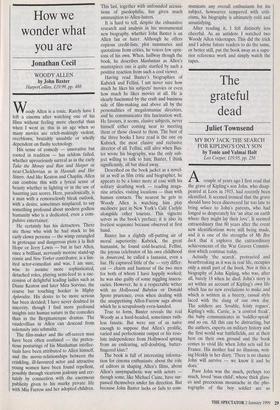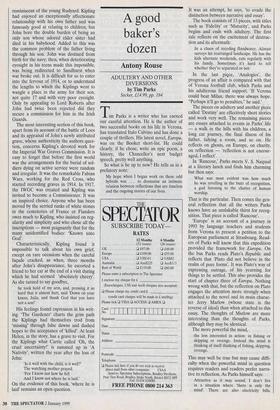The grateful dead
Juliet Townsend
MY BOY JACK: THE SEARCH FOR KIPLING'S ONLY SON by Tonle and Valmai Holt Leo Cooper, L19.95, pp. 256 Acouple of years ago I first read that the grave of Kipling's son John, who disap- peared at Loos in 1915, had recently been identified. It seemed ironical that the grave should have been discovered far too late to bring solace to John's parents, who had longed so desperately for 'an altar on earth where they might lay their love'. It seemed extraordinary that 80 years after the event new identifications were still being made, and it is one of the strengths of My Boy Jack that it explores the extraordinary achievements of the War Graves Commis- sion which continue today.
Actually 'the search', protracted and heartbreaking as it was in real life, occupies only a small part of the book. Nor is this a biography of John Kipling, who was, after all, barely 18 when he died. John's story is set within an account of Kipling's own life which has no new revelations to make and which is written in a breezy, casual style laced with the slang of our own day. The soldiers are 'lovable, feisty rogues', Kipling's wife, Carrie, is 'a control freak', the baby communicates in 'toddler-speak' and so on. All this can be distracting, but the authors, experts on military history and the first world war battlefields, are at their best on their own ground and the book comes to vivid life when John sets sail for France. His mother had no illusions, writ- ing bleakly in her diary, 'There is no chance John will survive — we know it and he does.'
Poor John was the much, perhaps too much, loved 'man child', whose thick glass- es and precocious moustache in the pho- tographs of the boy soldier are so reminiscent of the young Rudyard. Kipling had enjoyed an exceptionally affectionate relationship with his own father and was famously good at relating to children, but John bore the double burden of being an only son whose adored elder sister had died in his babyhood. Added to this was the common problem of the father living through his son. John was destined from birth for the navy; then, when deteriorating eyesight in his teens made this impossible, was being redirected to Sandhurst when war broke out. It is difficult for us to enter into the fervour of 1914, or to understand the lengths to which the Kiplings went to wangle a place in the army for their son, not quite 17 and with very poor eyesight. Only by appealing to Lord Roberts after John had twice been rejected did they secure a commission for him in the Irish Guards.
The most interesting section of this book, apart from its account of the battle of Loos and its appraisal of John's newly attributed grave, whose authenticity the authors ques- tion, concerns Kipling's devoted work for the Imperial War Graves Commission. It is easy to forget that before the first world war the arrangements for the burial of sol- diers dying on active service were random and irregular. It was the remarkable Fabian Ware, working for the Red Cross, who started recording graves in 1914. In 1917, the IWGC was created and Kipling was invited to become a Commissioner. It was an inspired choice. Anyone who has been moved by the serried ranks of white stones in the cemeteries of France or Flanders owes much to Kipling, who insisted on reg- ularity and simplicity and who chose all the inscriptions — most poignantly that for the many unidentified bodies: 'Known unto God'.
Characteristically, Kipling found it impossible to talk about his own grief, except on rare occasions when the careful façade cracked, as when, three months after John's disappearance, he escorted a friend to her car at the end of a visit during which he had seemed 'absolutely cheery'. As she turned to say goodbye,
he took hold of my arm, and, pressing it so hard that it almost hurt, said 'Down on your knees, Julia, and thank God that you have not a son!'
His feelings found expression in his writ- ing. 'The Gardener' charts the grim path the Kiplings had themselves trod from `missing' through false dawns and dashed hopes to the acceptance of 'killed'. At least Helen, in the story, has a grave to visit. For the Kiplings what Carrie called 'Oh, the cruel uncertainty!' is summed up in 'A Nativity', written the year after the loss of John:
'Is it well with the child, is it well?'
The watching mother prayed.
'For I know not how he fell
And I know not where he is laid.'
On the evidence of this book, 'where he is laid' remains an open question.



























































 Previous page
Previous page